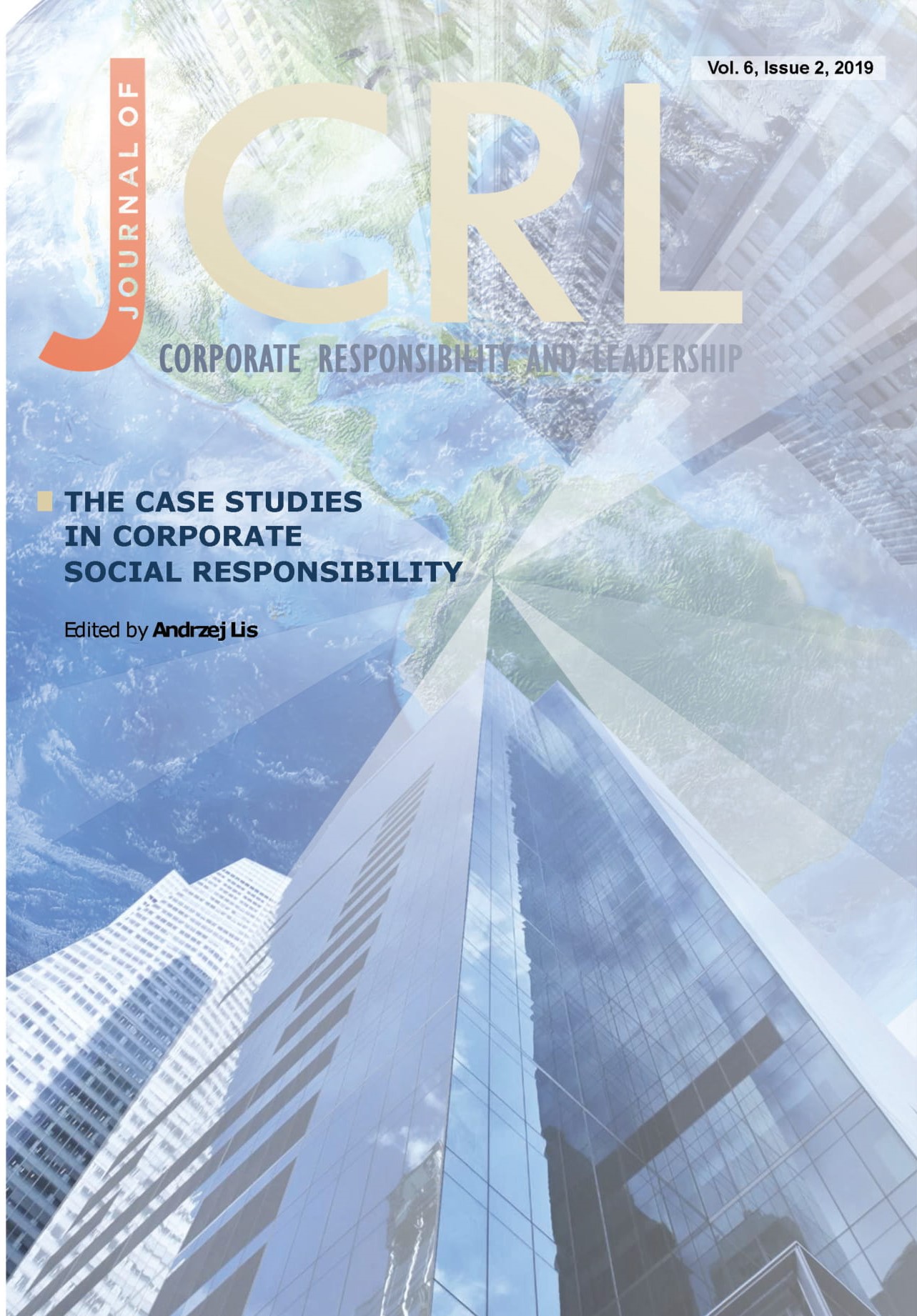The Simulacra of Responsibility? The Efficiency of Global CSR Policies in CEE Countries: The Case Study of a Chemical MNE
DOI :
https://doi.org/10.12775/JCRL.2019.008Mots-clés
CSR policies, multinational enterprises, simulacrum, labourRésumé
The aim: The paper discusses global CSR policies applied by
multinational companies as well as identifies existing differences in the approaches to CSR presented by multinational enterprises (MNEs) in their headquarters and foreign subsidiaries located in the CEE region. The study concentrates on the labour perspective, as labour costs and access to qualified workforce are claimed to be determinants of the investment’s location. Methodology: The qualitative single case study methodology was applied. A MNE of Japanese origin operating in the chemical industry and its Polish subsidiaries were the units of analysis. Main findings: The study shows that the headquarters seem to be much more advanced in CSR than foreign subsidiaries. Some discrepancy between declaration and practice has been noticed from the Polish labour viewpoint. This may be associated with the style of diffusion of practices in industrial relations and HRM, and may create only a specific simulacrum of social responsibility. Also, the asymmetry in quality of information on CSR policies implemented in the parent company was observed what may affect the transparency of a whole group. Implication for further research: Exploration of other major competitors originating from other countries, operating in Poland, possessing significant market shares could help to reveal the level of advancement and presence of self-regulatory CSR mechanisms supporting the creation of local CSR approaches in the Polish subsidiaries of MNEs in the chemical industry. It could also reflect the trade union capacity in use of CSR tools for social monitoring of human and trade union rights at the workplace and their interests in contribution to building more sustainable workplace.
Références
Baudrilliard, J. (1981). Simulacra and Simulation. The University Michigan Press.
Bustamante, S. (2011). Localization vs. Standardization: Global Approaches to CSR Management in Multinational Companies (Working Paper No. 60). Berlin School
of Economics and Law.
Campbell, J., Eden, L., & Miller, S. (2012). Multinationals and corporate social responsibility in host countries: Does distance matter? Journal of International Business Studies, 43, 84–106.
Cassin, R. (2016). VW’s 14.7 billion US dollars compliance failure: Deal announced to settle U.S. civil emission claims. Retrieved from http://www.fcpablog.com/blog/2016/6/28/vws-147-billion-compliance-failure-deal-announced-to-settle.html
(accessed 28 June 2016).
Creswell, R. J. (2013) Projektowanie badań naukowych: Metody jakościowe, ilościowe i mieszane, Kraków: Wydawnictwo Uniwersytetu Jagiellońskiego.
Czarniawska, B. (2014). Social Science Research: From Field to Desk. London: Sage Publications.
Daniel, C., Wilde-Ramsing, J., Genovese, K., & Sandjojo, V. (2015). Remedy Remains Rare: An Analysis of 15 Years of NCP Cases and Their Contribution to Improve Access to Remedy for Victims of Corporate Misconduct. Amsterdam: OECD Watch.
Dicken, P. (2003). Global Shift Reshaping the Global Economic Map in the 21st Century. London: Sage Publication.
Enderwick, P. (2005). Attracting “desirable” FDI: Theory and evidence. Transnational Corporations, 14(2), 93–119.
European Commission (2011). Renewed EU Strategy 2011–2014 for Corporate Social Responsibility. Brussels: European Commission.
Ferner, A. (1997). Country of origin effects and HRM in multinational companies. Human Resource Management Journal, 7(1), 19–37.
Van Klaveren, M., Tijdens, K., & Gregory, D. (2013). Working in Multinationals and Domestic Firm Compared- Myths and Realities (ETUI Policy Brief No. 1/2013).Brussels.
Jamali, D. (2010), The CSR of MNC subsidiaries in developing countries: Global, local, substantive or diluted? Journal of Business Ethics, 93(2), 181–200.
Jarzabkowski, P., & Spee, A. P. 2009. Strategy as practice: A review and future directions for the field. International Journal of Management Reviews, 11(1), 69–95.
Marginson, P (2016). Trade Unions and Multinational Companies: A Multi-level Challenge (Warwick Papers in Industrial Relations No. 103). Warwick: The University of Warwick.
McCrudden, Ch. (2006). Corporate Social Responsibility and Public Procurement (Working Paper No 9/2006). University of Oxford.
Montiel, I. & Delgado-Ceballos, J. (2014). Defining and
measuring corporate sustainability: Are we there yet?. Organisation & Environment, 27(2), 113–139.
Muller-Camen, M., Almond, P., Gunnigle, P., Quintanilla, J., & Tempel, A. (2003). Between home and host country: Multinationals and employment relations in
Europe. Industrial Relations Journal, 32(5), 435–448.
OECD (2011). OECD Guidelines for Multinational Enterprises. Paris: OECD Publishing.
Piskalski, G. (2015). Społeczna odpowiedzialność biznesu w polskich realiach: Teoria a praktyka. Raport z monitoringu społecznej odpowiedzialności największych
polskich firm. Warszawa: Fundacja Centrum CSR.PL.
Post, J., Preston, L., & Sauter-Sachs, S. (2002). Redefining the Corporations: Stakeholder
Management and Organizational Wealth. Stanford: Stanford University Press.
Pournarakis, M., & Varskelis, C. N. (2002). Foreign direct investment in Central and Eastern European Countries: Do institutions matter? Paper presented at the EIBA Annual Conference, December 2002, Athens. Retrieved from http://citeseerx.ist.psu.edu/viewdoc/download?doi=10.1.1.195.993&rep=rep1&type=pdf (accessed
June 2016).
TUAC (2016). The OECD Guidelines for Multinational Enterprises. Paris: Trade Union Advisory Committee.
Yin, R. K. (2014). Studium przypadku w badaniach naukowych: Projektowanie i metody. Kraków: Wydawnictwo Uniwersytetu Jagiellońskiego.
Téléchargements
Publié-e
Comment citer
Numéro
Rubrique
Stats
Number of views and downloads: 707
Number of citations: 0



